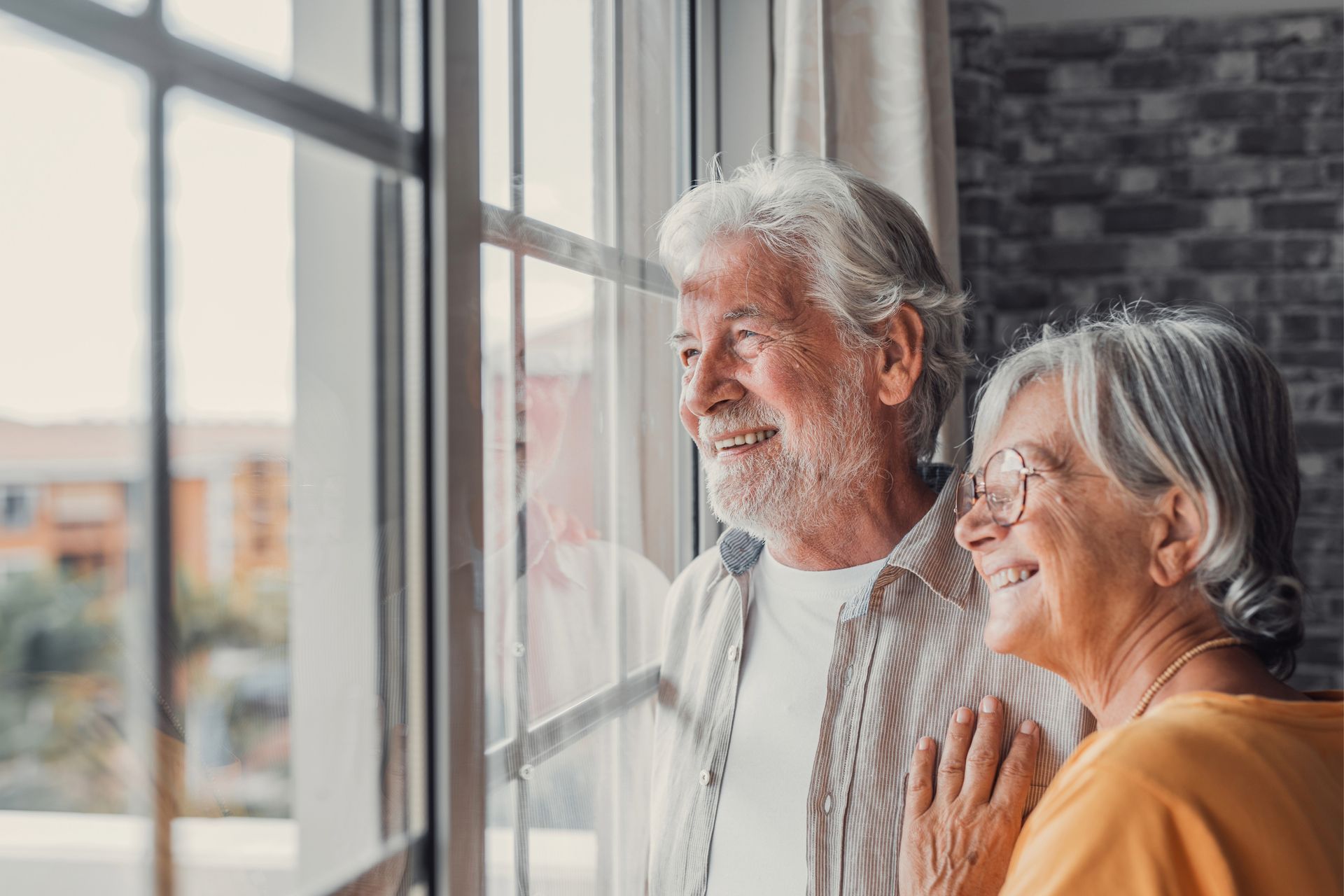INS LifeGuard
12 Helpful Tips to Overcome Social Isolation and Loneliness

Are you grappling with the challenges of social isolation and loneliness? Perhaps you are searching for practical solutions to foster connections and enhance your well-being? This guide delves into the causes of your loneliness and social isolation as well as their impact on your well-being.
Whether you're navigating life changes, experiencing transitions, or simply seeking ways to strengthen your social bonds, our 12 helpful tips will help you overcome isolation, reconnect with others, and foster a more fulfilling and independent life. Continue reading to learn valuable insights and bring meaningful connections back into your life.
What is the difference between social isolation and loneliness?
While loneliness and isolation are related concepts, they are not exactly the same. Loneliness refers to the distressing feeling of being alone, disconnected, or socially isolated, even if the person is physically surrounded by other people. It is about the perceived quality of social relationships and the sense of being alone, regardless of the number of people present.
Social isolation refers to the state of being physically separated or detached from others or only having few people to interact with on a regular basis. While loneliness can occur in the presence of others, being isolated or living alone doesn't automatically result in loneliness or social isolation. Hence, it's possible to be isolated without feeling lonely, and one can feel lonely even in a crowd.
What causes social isolation and loneliness?
Social isolation can result from various factors, and its causes are often complex and interconnected. Some common contributors to social isolation include:
- Loss of a loved one
- Relationship problems
- Retirement or unemployment
- Life transitions
- Mental, physical, and emotional health issues
- Financial constraints
- Relocation without family, friends or community networks
- Language and cultural barriers
- Age-related factors
- Stigma or discrimination
What are the effects of social isolation and loneliness?
Social isolation and loneliness can have a range of detrimental effects on an individual's overall well-being, encompassing various aspects of physical, mental, and emotional health. Some common effects include:
Mental Health Problems
Prolonged social isolation and loneliness often affect one's overall mental and emotional health. This leads to an increased risk of depression, anxiety, panic attacks, despair, feeling paranoid, and other mental disorders. For older adults, increased stress levels may even result to a higher risk of cognitive decline and dementia.
Emotional Distress
Loneliness can lead to feelings of irritability or frustration, especially when social outlets for emotional expression are limited. The absence of regular social interactions can significantly contribute to a heightened emotional sensitivity, making it challenging to cope with daily stressors.
Reduced Cognitive Function
Loneliness and social isolation can both affect cognitive function, leading the person to experience difficulties in concentrating, making decisions, or remembering things. In worst cases, prolonged social isolation can lead to a heightened risk of cognitive decline and neurodegenerative conditions.
Decreased Motivation
Individuals grappling with loneliness and social isolation often experience a loss of motivation and reduced interest in activities they once enjoyed. This diminished engagement can contribute to physical inactivity, which can impact both their physical and mental well-being.
Sleep Problems
Sleep plays a vital role in physical and mental health and persistent insomnia and disruptions in sleep patterns can cause feelings of fatigue, contribute to mood disturbances, and negatively affect cognitive function. As the quality of sleep is compromised, it can have a significant impact on one's overall well-being. Sleep disturbances may include difficulty falling asleep, frequent awakenings during the night, or waking up too early.

Changes in Appetite
Loneliness can influence eating habits, prompting individuals to respond to emotional distress through either overeating or undereating. For those who seek comfort in food, this may result in overconsumption and potential weight gain. Conversely, loneliness can lead to a loss of appetite, contributing to undereating and subsequent weight loss.
Physical Health Issues
Chronic loneliness has been associated with various physical health problems, including:
- headaches
- muscle tension
- gastrointestinal issues
- cardiovascular issues
- heart disease
- stroke
- weakened immune system
- age-related cognitive impairment
Unhealthy Habits
People who feel lonely or socially isolated tend to engage in sedentary lifestyles that involve insufficient physical activity, excessive alcohol consumption, smoking, and often struggle with sleep. These unhealthy habits significantly increases their risk of having severe health problems in the future.
Substance Abuse
Since most individuals suffering with loneliness and social isolation have limited contact with people who could help address their emotional challenges, they often resort to substance use as their coping mechanism. This reliance on substances, such as alcohol or drugs, may temporarily alleviate feelings of distress but can cause mental issues in the long run.
Low Self-Esteem
The cycle of loneliness often intertwines with feelings of inadequacy or a sense of not being valued. Individuals who feel socially isolated may struggle to recognise their inherent value and may perceive themselves less positively. This struggle with negative self-perception can, in turn, impact their self-esteem and self-worth.
Decreased Relationship Satisfaction
This emotional distance that loneliness and social isolation causes can strain relationships, making it harder for the individual to communicate effectively to others. Without a strong social support, individuals may overly depend on a single relationship to meet all their emotional needs. This can place undue pressure and consequently, this reliance can lead to a perceived decline in overall relationship satisfaction.
Who suffers from social isolation and loneliness?
Social isolation and loneliness can be experienced by people of all age groups, backgrounds, and circumstances. The factors contributing to these experiences are diverse and may vary from individual to individual. Here are some groups that may be particularly vulnerable to loneliness and social isolation:
Older Adults
Older adults, especially those living alone or in care facilities, are at greater risk of facing social isolation due to factors such as memory loss, limited mobility, physical and mental health problems, or the loss of friends and family members. Additionally, retirement and limited access to transportation or technology can also further worsen these challenges, making it difficult for older adults to engage in social activities or maintain connections with loved ones.
People with Disabilities
People with mental and physical health disabilities may face difficulties in socialising or participating in social activities, which can potentially lead to social isolation. Problems with accessibility in public places can also restrict their involvement in social events. Furthermore, lack of awareness and understanding about various disabilities can lead to social exclusion.
New Immigrants or Refugees
New immigrants or refugees who have recently moved to a new country may experience social isolation due to cultural and language barriers, as well as the absence of established social connectedness. As they encounter difficulties integrating into their new communities, it's crucial to foster inclusive environments that welcome diversity.
Marginalised Groups
Current research suggests that marginalised groups including people of color, LGBTQ+ folks, indigenous people, and those of a lower socio-economic status, often feel lonely and suffer social isolation due to systemic disadvantages, economic disparities, underrepresentation in political and cultural spheres, rejection, bullying, and discrimination.
Individuals with Serious Health Conditions
Individuals facing serious health conditions often experience loneliness and social isolation due to various factors. Physical limitations stemming from their condition may impede social interaction, resulting to feelings of social exclusion. Furthermore, reduced mobility, financial strain, changes in relationships, limited social support networks, and the emotional impact of the condition can further worsen feelings of loneliness and social isolation.
Single Parents
Single parents, particularly those facing economic challenges, may experience social isolation due to the demands of parenting and limited time for social activities. Juggling work, childcare responsibilities, and financial constraints may restrict opportunities for social connection, leading them to feel socially isolated.
People in Rural Areas
Individuals living in remote or rural areas may face geographical barriers, making it more challenging for them to access social opportunities and connect with others. In addition, the distance to urban centers can make it logistically difficult for individuals in rural areas to participate in social events or engage in regular social interactions.
Youth and Adolescents
Despite being in social environments like schools, young people may still experience social isolation and loneliness due to factors such as bullying, social pressure, body image issues, or difficulty forming meaningful social connections. The adolescent years, marked by significant transitions and identity development, often come with unique social challenges that make them feel socially isolated.
Individuals Experiencing Life Transitions
Major life experiences, such as retirement, divorce, mental health condition, or the loss of a loved one, can contribute to loneliness and social isolation during periods of adjustment. Retirement may disrupt established social networks tied to the workplace, while divorce can lead to a restructuring of social circles. Managing mental health conditions can involve complex emotional journeys, and grieving the loss of a loved one can create feelings of chronic loneliness and social isolation.
What can people do to address feelings of loneliness and social isolation?
Addressing social isolation and loneliness involves incorporating simple yet effective strategies to build connections and enhance well-being. Some practical ways to tackle these challenges include:
1. Connect with loved ones
Connecting with family members and friends regularly, whether through calls, video chats, or in-person visits can help you feel better and reduce the risk of social isolation. Strong connections with loved ones provide emotional support, companionship, and a sense of belonging. Whether sharing daily experiences, discussing concerns, or simply enjoying each other's company, reaching out to loved ones can improve your overall well-being.

2. Go outside and attend events
Start by spending time outdoors and attending local events, gatherings, or cultural activities. You don't have to engage socially right away. Taking gradual steps allows you to ease into social interactions at your own pace. Explore your local community, observe, and gradually participate in activities that interest you. This approach can help build comfort and confidence as you navigate social situations.
3. Participate in social gatherings
Keep in mind that building connections takes time. Be patient with yourself and others. Gradually expand your social circle by participating in clubs, classes, or community groups, where you share common interests with others. Building relationships is a gradual process, and each step you take contributes to a more connected and fulfilling social life.
4. Volunteer in community activities
Volunteering is not only a way to give back to the community but it's also an excellent approach to build meaningful connections with others. By engaging in volunteer activities, you not only contribute your time and skills to a worthy cause but you also get to interact with like-minded individuals who share a passion for making a positive impact. The shared sense of purpose and camaraderie in volunteer work can contribute significantly to combating social isolation and fostering a sense of belonging.
5. Stay physically active
Try to stay active by engaging in group exercises like joining a walking club or working out with a friend. Remember, the journey toward a more active lifestyle may present challenges initially, but with consistent effort, you'll likely find it to be a rewarding and sociable endeavor. Aim for at least 150 minutes of challenging activity each week. Over time, you will notice improvements in your physical and mental well-being.
6. Adopt a pet
Having a pet can bring immense joy and companionship into your life. If you're capable of adopting a pet, think about bringing one into your life. Pets not only provide comfort but have also been proven to reduce stress and lower blood pressure. The bond formed with a pet can offer a sense of purpose and routine, creating a supportive and uplifting presence in your daily life.
7. Explore hobbies
Pursue hobbies or activities you enjoy. You can either revive an old hobby or enroll a class to learn something new. By discovering and engaging in an activity that you love, you can have fun while meeting other people who share the same interests as yours.
8. Use social media
Research indicates that social media can have positive effects on fostering social connections, particularly for adolescents seeking peer interactions online. By connecting with others online through social media platforms, individuals with higher levels of social anxiety can decrease their feelings of social isolation and loneliness. This engagement can contribute to psychosocial well-being, support identity development, and enhance a sense of belonging.
9. Take your time and be kind to yourself
Recognise that experiencing loneliness and social isolation is a common human experience and not a reflection of personal failure. It's essential to acknowledge and validate your feelings without judgment. Embracing self-compassion can empower you to take positive steps towards building meaningful social connections and enhancing your personal growth and overall well-being.
10. Enhance your safety and security
Ensuring safety and peace of mind is crucial for overcoming social isolation and loneliness. Personal alarms create a safety net for individuals facing solitude. These alarms not only provide a sense of security but also offer a reliable connection to assistance whenever needed. Whether it's the comfort of knowing help is just a button press away or the added layer of security during daily activities, a personal alarm for everyone significantly contributes to a more secure and independent lifestyle.
11. Practice mindfulness
By cultivating awareness of the present moment and fostering a non-judgmental acceptance of one's feelings, individuals can prevent feelings of social isolation and loneliness. Mindfulness encourages a deeper connection with oneself and the surrounding environment, providing the person with a sense of grounding and stability. This intentional focus on the present can alleviate feelings of isolation and promote a more balanced and contented mental state. Moreover, incorporating mindfulness into daily routines can be a proactive step towards building resilience and maintaining social connections.
12. Seek professional help
If feelings of loneliness and social isolation persist, the best thing to do is to consider seeking support from mental health professionals, counsellors, or support groups. INS LifeGuard has a 24/7 Emergency Response Centre that is staffed by highly qualified and experienced nurses. If you are feeling lonely and need someone to talk to, an INS Nurse is available around the clock for a chat. Whether it's day or night, they are here to support you whenever you feel the need to connect.
Takeaway
Overcoming social isolation and loneliness involves understanding oneself, forming genuine connections, and cultivating a more fulfilling life. By applying the practical tips provided, individuals can actively work towards reconnecting with others and building a support system that promotes happiness and independence. Through these efforts, one can break free from the confines of isolation, leading to a richer, more socially connected, and emotionally satisfying life.
If you or someone you care for is experiencing isolation and loneliness, INS LifeGuard's personal alarms ensure prompt assistance. With just one press of a button, you can contact our highly qualified and experienced nurses who are available 24/7 to offer you the support and help that you need.
Call 1800 636 040 to find out more about our products and healthcare services or visit our website here.

About
INS LifeGuard is the only 24/7 nurse on-call personal and medical monitoring in Australia. We provide monitoring technology for both in the home and on the go and can also monitor other provider's equipment. Our services are suitable for anyone wanting support to stay independent such as the elderly, those with medical conditions and disabilities plus enhancing safety and security for lone workers.
Related Articles

-
Visit our website here
I hope you enjoy reading this blog post
INS LifeGuard is the only nurse on-call personal and medical alarm service in Australia. If you would like more information about INS LifeGuards solutions, visit our website here.
I hope you enjoy reading this blog post.
INS LifeGuard is the only nurse on-call personal and medical alarm service in Australia. If you would like more information about INS LifeGuards solutions, visit our website
here.

INS LifeGuard is the only nurse on-call personal emergency response service in Australia. We have a commitment to healthcare innovation which includes personal alarms and medical alert solutions that make independence easier, safer and more enjoyable.
Our services support Seniors, Carers, Providers, NDIS Participants, Retirement Villages, DVA, Lone Workers and anyone that wants the security that help is a press of a button away.
LATEST POSTS
PO Box 485 Unanderra NSW 2526 Australia
INS LifeGuard
International Enquiries
INS CareCall supplies and monitors emergency response equipment and services, including hardware manufactured by Chiptech, Smart-Caller, SmartLink, and the LifeGuard L-Series Diallers.
Monitoring of alarms is provided through INS LifeGuard's unique Emergency Response Centre, which is the only personal alarm response centre staffed by qualified nurses. This is an important distinction.
Quicklinks
Supporting
PO Box 485 Unanderra NSW 2526 Australia
INS LifeGuard
International Enquiries












